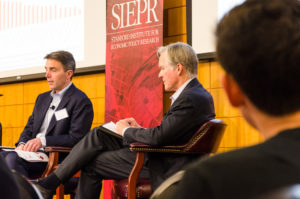Last week, former New York Times Executive Editor Bill Keller opened a forum hosted by the Stanford Institute for Economic Policy Research (SIEPR), speaking to the question, “Is America in the midst of a crime wave?”
SIEPR’s forum focused on rethinking the criminal justice system in terms of crime, policing and incarceration. Experts tackled topics including the trust between the police forces and communities, the use of technology in fighting crime, and the prospect of downsizing prisons in California. The Daily sat down with Keller, who currently serves as editor-in-chief of the Marshall Project, a nonprofit news organization dedicated to criminal justice.

The Stanford Daily (TSD): What inspired you to get involved with the Marshall Project after working at The New York Times?
Bill Keller (BK): The founder of the Marshall Project was Neil Barsky. He approached me through a mutual friend and asked if I wanted to help him build the project, and honestly I had not taken any particular interest in the criminal justice system before that. However, at that time, I was writing a column for the op-ed page, so I decided I’d write a couple of columns about criminal justice issues and see how it felt. After writing a few columns, I was determined to write on this issue.
The system is a mess in many ways. Moreover, the journalistic world is retrenching and doing a lot less investigative reporting, resulting in less coverage of the criminal justice system. Consequently, I felt that there was certainly room for someone to move into that space.
It also felt like there was a shift in public opinion regarding this issue. There has actually been some bipartisan interest in fixing the system. I was kind of fascinated by the number of conservatives who embraced various aspects of criminal justice reform, which was refreshing considering that the country is polarized and paralyzed on almost every other issue.
TSD: What was it like moving to a completely new place with your career?
BK: Starting something from scratch was kind of appealing. We started with nothing. Neil provided the original startup funds, and we got friends and acquaintances to provide some more. We had to build up the content management system and a website. We had to hire reporters and editors and essentially figure out the daily grind of a business. Inventing something from scratch was very exciting.
I would always tell my subordinates, if they had multiple offers, to take the one that scares you more. Part of the appeal was it was scary.
TSD: What other challenges have you faced since you have been at the Marshall Project?
BK: One of the challenges is to uphold a high quality of journalism in a world where everyone has such strong opinions. There are a lot of temptations to shift into advocacy, and those are temptations we have to resist because we operate on a partnership model. Almost everything we do is published in collaboration with somebody else. We have about 70 partners, from NPR to the New York Times to local newspapers, and they partner with us eagerly because we have credibility, because we are not an advertising group. However, we have a lot of young reporters. Making sure that they report against their own convictions and assumptions is really important and has been a significant challenge.
TSD: Have you personally or have individuals at the Marshall Project thought of ways to improve the conditions of the criminal justice system?
BK: We write about other people’s attempts to improve conditions. One of the stories that we followed pretty closely was Raise the Age, which aims to reduce the number of teenagers entering the adult criminal justice system where they’re vulnerable.
One of our first pieces was about Attica Prison, where guards violently attacked an inmate. After the story ran, the prison installed 300 cameras in places in the prison that were favorite spots for the guards to beat up prisoners. It’s not very often that you have that measurable impact, but when you do, there’s nothing quite as satisfying as that.
TSD: How do you plan on expanding the Marshall Project’s coverage?
BK: Those plans changed a bit in November because of the election. We’re covering a lot of people trying to defend things instituted under the Obama administration. Things like consent decrees, where the feds come in to help troubled police departments — things like immigration and deportation, drug policy.
TSD: What advice would you have for individuals interested in journalism given your wide range of experiences?
BK: Journalism is not a very welcoming climate. I came to realize that the major source of talent is going to be journalism schools, and therefore going to journalism school matters a lot. Another way to get into journalism is to develop an area of expertise in any field, like law or climate science. We’ve hired people for their technical skills, like our chief of technology. He’s a Google-trained engineer who was frustrated at Google and wanted to do good. Editors also like the gumption to take risks and ask people questions.
TSD: How could a Stanford student get involved in the Marshall Project?
BK:Joan Petersilia, a professor at the Law School, and I have been talking in vague terms of whether we can have a joint venture between the Marshall Project and some students at the Law School. The difficulty is that we’re a small outfit, and running a group of students with limited journalistic experience takes a lot of bandwidth. We want to start with a focus and keep it small. We do also have summer internships, but we don’t have a budget for them, so they will need a stipend.
This transcript has been lightly edited and condensed.
Contact Vibhav Mariwala at vibhavm ‘at’ stanford.edu.
